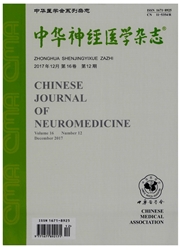

 中文摘要:
中文摘要:
目的构建小鼠L-型钙通道CaV1-2α1,亚基(α1C)末端的原核重组载体并进行表达和鉴定。方法根据小鼠α1C基因序列设计合成特异性引物,PCR扩增出其C末端(1808-2139)基因,插入谷胱甘肽巯基转移酶(GST)融合表达载体pGEX—KG中,在大肠杆菌BL21中诱导GST融合蛋白的表达。结果构建的重组质粒经酶切后可见约1000bp、5000bp大小的片段,与预期结果一致,测序结果表明序列正确。在异丙基-β-硫代半乳糖苷(IPTG)的诱导下,重组菌表达出一个分子量约为70ku的表达产物,Westemblot结果证实重组GST融合蛋白可与针对α1C亚基C末端的抗体发生特异性的反应。结论小鼠α1C亚基的C末端编码序列已被克隆至GST融合表达载体pGEX-KG中,并在大肠杆菌BL21中获得表达.为进一步纯化和研究相互作用蛋白奠定了基础。
 英文摘要:
英文摘要:
Objective To construct a prokaryotic recombinant vector for mouse L-type calcium channel α1C C-terminus and to detect its expression in BL21. Methods The coding sequence of mouse α1C C-terminus (1808-2139) was amplified with specific primers and cloned into the glutathione-S-transferase (GST) fusion expression vector pGEX-KG. Then the recombinant plasmid was transformed into E.coli BL21 and the expression of GST fusion protein was induced by adding isopropylthiogalactoside (IPTG). Results Restriction digestion of the constructed recombinant plasmid revealed the existence of gene segments about 1 000 or 5 000 bp in length, which were in accordance with what had been expected and the result of sequencing showed that the coding sequence C-terminus of mouse α1C subunit was correct. A protein band with a molecular weight of about 70 ku was induced by IPTG in the recombinant plasmid. Western blot assay revealed that the GST fusion protein could be specifically recognized by α1C C-terminus antibody. Conclusion The coding sequence of mouse Cqc C-terminus has been successfully cloned into the GST fusion expression vector pGEX-KG and efficiently expressed in E.coli BL21, which lay the foundation for further purifying and studying α1C interactive protein.
 同期刊论文项目
同期刊论文项目
 同项目期刊论文
同项目期刊论文
 Contribution of down-regulation of L-type calcium currents to delayed neuronal death in rat hippocam
Contribution of down-regulation of L-type calcium currents to delayed neuronal death in rat hippocam Nitric oxide modulation of voltage-gated calcium current by S-nitrosylation and cGMP pathway in cult
Nitric oxide modulation of voltage-gated calcium current by S-nitrosylation and cGMP pathway in cult Mitochondrial BNIP3 upregulation precedes endonuclease G translocation in hippocampal neuronal death
Mitochondrial BNIP3 upregulation precedes endonuclease G translocation in hippocampal neuronal death Neuroprotective effects of Xiao-Xu-Ming Decoction against ischemic neuronal injury in vivo and in vi
Neuroprotective effects of Xiao-Xu-Ming Decoction against ischemic neuronal injury in vivo and in vi 期刊信息
期刊信息
